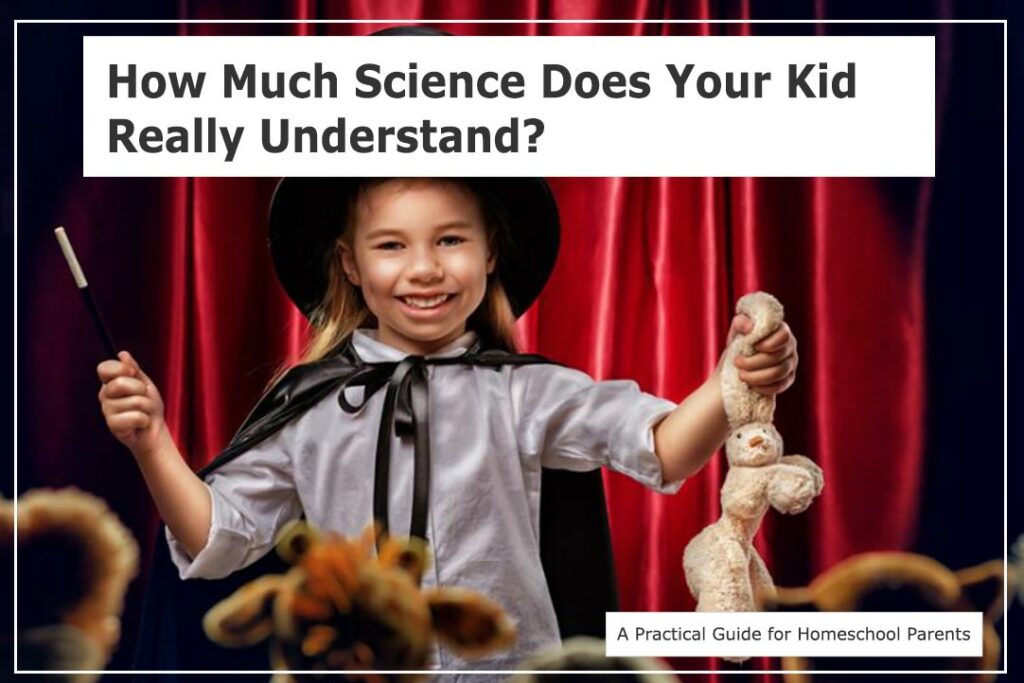how do you know what your kids really understand from their studies?
Test Your Kids with a FUN Lab Practical!
Want to challenge your kids’ curiosity and scientific thinking in an engaging way? Try this! These fun, thought-provoking questions are designed to test your child’s understanding of basic scientific principles—but with a twist.
Instead of memorized textbook definitions, encourage your kids to explain the answers in their own words—without using “big science terms.” The goal is for them to really understand and demonstrate what’s happening in a way that’s clear and creative.
How to Use These Questions
- Weekly Challenge: Pick one question each week and have your child investigate it thoroughly. Let them create a mini-presentation (think after-dinner “kid show”) to show off what they’ve learned.
- Science Magic Show: Turn their presentation into a hands-on demonstration where they explain AND show what’s happening.
- Dinner Table Discussions: Use these questions to spark fun, science-filled conversations with the whole family.
The Ultimate "Science Lab Practical" Questions to ask kids:
- Why do airplanes fly? How is flight achieved? What forces must work together to get and keep a plane airborne?
- Why do you get shocked on dry days when you scuff across the carpet? Explain without using the term “static electricity.” What’s happening at the particle level?
- Why does a compass needle flutter near an electrical cord?
- Why does my food come out of the microwave with hot and cold spots?
- What two colors make yellow light, and is this different if we mixing those same two colors using paint instead of light?
- Why does soda explode when you shake it?
- What happens when you burp or fart in space, far from any planets or stars?
- Why does water come out of the hose faster when you put your thumb over the end?
- Why does a ball roll down a hill faster if you start it higher up?
- Why do rockets have fins instead of wings?
- Why don’t planets fly off into space instead of orbiting the sun?
- What happens if the sun were to instantly disappear?
- If you scream in outer space, can anyone hear you? How could you make your scream detectable?
- What happens to a cup of hot coffee on a cold morning? Why?
- What happens when you put an inflated balloon into a very cold freezer?
- Can I make a laser from a flashlight? Why or why not?
Extra Credit Questions for Kids who love Physics:
- If I’m traveling near the speed of light and turn on my headlights, what happens?
- What is a black hole, and why can’t even light escape from it? Encourage them to explain how gravity and spacetime interact near a black hole and why the event horizon is a critical boundary.
- How does quantum entanglement work, and why do scientists call it “spooky action at a distance”? Can they describe how particles can be linked in such a way that the state of one instantly affects the other, no matter the distance?
- If time slows down near a black hole (gravitational time dilation), what would an observer far from the black hole see happening to someone close to it? Push them to explore the idea of time dilation from different perspectives.
- What is the difference between dark matter and dark energy, and why do scientists think they exist? Can they explain how dark matter affects galaxies and how dark energy is connected to the expansion of the universe?
- What happens to particles when they approach the speed of light? Have them explore ideas like relativistic mass increase, time dilation, and length contraction.
- How does the Higgs boson give particles their mass? Challenge them to explain the Higgs field and how it interacts with particles to generate mass.
- What is wave-particle duality, and how does it affect the way we think about light and matter? Ask them to describe how light and electrons can behave as both waves and particles, depending on how they’re observed.
- What is the Heisenberg Uncertainty Principle, and why can’t we know both the position and momentum of a particle exactly? Push them to think about the fundamental limits of measurement in quantum mechanics.
- Why does time flow forward, and what role does entropy play in the “arrow of time”? Explore the relationship between thermodynamics, entropy, and why time seems to have a direction.
Encourage them to discuss redshift, cosmic microwave background radiation, and theories like the Big Rip or heat death of the universe.
Final thoughts...
This activity encourages critical thinking, creativity, and hands-on exploration. It’s not just about “getting the right answer”—it’s about helping your child see science as something alive and exciting. Plus, when kids explain concepts in their own words, they deepen their understanding and develop the confidence to share what they’ve learned.
So, grab a question, spark some curiosity, and let your kids shine in their very own science show. Who knows? You might even learn something new yourself!
Just Enter Your Email To Receive
5 Free Hands-On Science Lessons!

Just enter your email and you’ll get instant access to this complete mini-science curriculum.
This free sample program includes:
See how easy it can be for you to go from “Frustrated” about not having enough time or resources for Science… To “Fascinated” by how your kids learn science better than EVER before because now they’re enjoying it!



